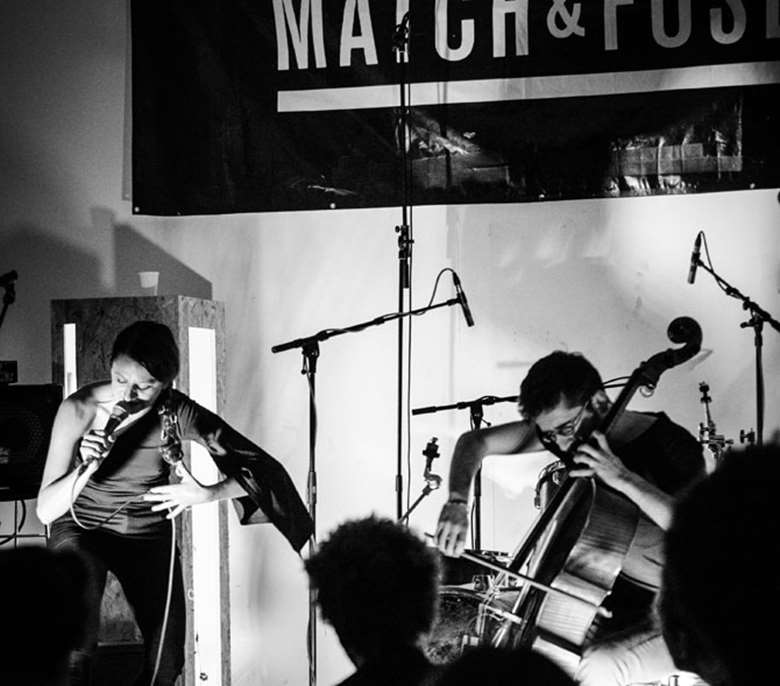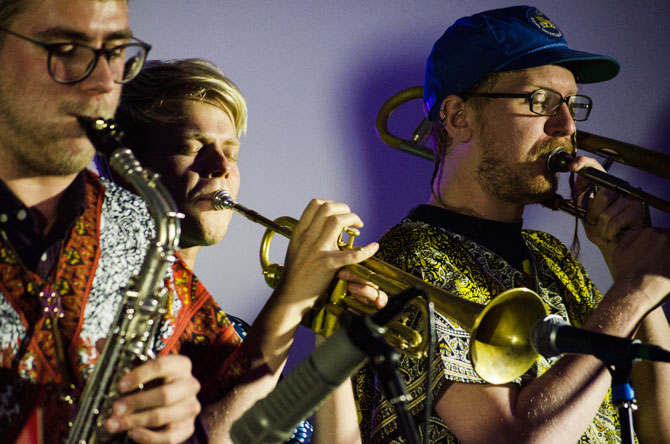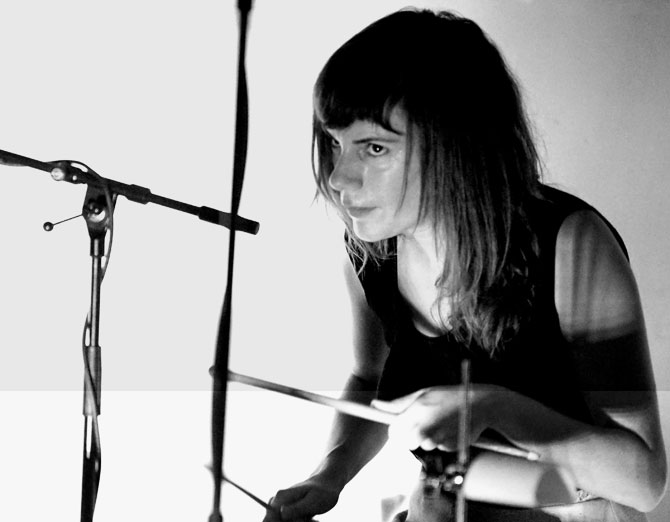Match&Fuse fest ignites with vocalist Leïla Martial and cellist Valentin Ceccaldi
Wednesday, November 2, 2016
Just what Brexit will mean for Europe's music scene is anyone's guess – though most people are guessing it won't be good.

A recent BBC News article warned of visas and restrictions on movement discouraging overseas acts from visiting the UK and making it more difficult and costly for UK acts to tour. It hinted at the disappearance of funding bodies too.
Scaremongering? I hope so. Perhaps it will come out in the wash. Right now though the outlook seems bleak and embarrassing for those of us who identify ourselves as musicians and music-lovers of Europe.
We need solutions, but we also need to rail against it all in the best way that we can: against the idiotic nostalgia for an imagined golden age, against mind-forged divisions and pig-headed insularity, and there's no better place to do that than Match&Fuse, where you can deafen and drown your sorrows in improv and irreverent, pan-European skronk.
Run by Dave Morecroft of UK punk-jazz outfit WorldService Project, M&F celebrates alternative music from across Europe and has branches in Oslo, Rome, Warsaw and Toulouse. This year's London edition billed itself as "a political 'up yours' to the obtuse world we find ourselves in" and came good on its promise by bringing together 23 acts from 14 countries across two days of leftfield music-making.
Saturday took place at East London venues Cafe OTO and the Vortex, as in previous years, with Evan Parker and portuguese trumpeter Susana Santos Silva topping the bill. But I went for Friday, which had the added benefit of being held at New River Studios, a converted furniture warehouse in Manor House run as a not-for-profit arts and performance space, which has just started hosting gigs. It sulks on an industrial estate, a few kicked-in-doors down from Cara House, an old office block full of studios and former squats (naturally, they now go for around £800 a month) that shake with the bass from warehouse parties at weekends. Just the sort of place for some anti-establishment musical agitating.
Two sets in New River's own warehouse space, adorned with freshly-painted murals, the stage framed by stacks of retro TVs, fitted the bill nicely. Norwegian power trio Krokofant cranked both volume and irreverence settings up to 11 for their headline slot. I couldn't tell you what they played, but then it's not really about the tunes. They're just the window dressing. It's about the thrill of standing in front of a sonic juggernaut and watching them burn: about the bellowing of Jørgen Mathisen's tenor, Tom Hasslan's face-melting, heavy rock guitar solos and the utterly compelling drumming of Axel Skalstad.
It's hard to take your eyes off him or to fully comprehend what he's doing as he plays – open mouthed, head lolling, half-leaning half-falling into his drums, clumps of blonde hair draining from beneath his beanie. There's a weird disconnect between what you're seeing and what you're hearing. His movements look sluggish, but he's getting so much done: decimating his tom toms and leading subtle changes of direction as Hasslan balls and Mathisen switches to bassy, flange-heavy synth. Even when the noise feels relentless there's enough going on beneath the surface to ensure you rarely zone out.

Horse Orchestra (above), another scandi outfit playing the warehouse stage, were equally engaging. They're a young Copenhagen-based septet whose approach is to rip up a bunch of genres (trad jazz, circus music, oompah/brass band, improv and occasionally hip hop) scrunch them into a ball and lob them at the audience – along with the tuba player's shoes, which landed in front of the stage with a thud as part of an introduction to the opening number full of squeaks, squawks, beats played from mobile phones and gleeful horsing around.
Daft as it all is, they can really play and they stormed through a set of orchestral originals that opened out into stirring chorals and cheery swingers and collapsed into passages of blustery free blowing. 'Ton of Tuna' brought a sparse, funk bassline and a hip hop head-nodder of a piano groove, with breaks for tuba tomfoolery; while 'Nackte Frau Mit Brille' opened with a fanfare upset by atonal whacks before snowballing into improvised chaos – the sound you'd hear if you rolled the band down a cartoon hill. Enormous fun.
Over in the Gig Room, an intimate white-walled space scattered with pink and yellow light boxes, UK four-piece Let Spin offered their thoughts on musical anarchy with charging alt-rock grooves that were swallowed up by moody bass and guitar or corralled by epic decelerandos. 'Walt's Waltz' was choppy, grungy and feral to the point of unhinged, with a keening alto solo from Chris Williams that was sheer joy. 'Disa', by drummer Finlay Panter, was another highlight and mixed Caribbean and Middle Eastern themes to brilliant effect (imagine Egyptian dub).
I had mixed feelings about Swiss punk rock quartet Massicot who dealt in pounding grooves and twangy melodies with occasional bursts of viciously-bowed violin that sounded like the squealing of an enraged robot chipmunk. Tune after tune banged its head against the walls of the Gig Room. Initial verdict: unpleasant and dull. And yet the thumping beats and repetitive vocals were so insistent and Massicot played them with such dedication by the end I was just about on board – a little concussed, but cheering along with everyone else.

At the other end of the subtlety spectrum was a French duo comprising vocalist Leïla Martial and cellist Valentin Ceccaldi, a member of drummer Sylvain Darrifourcq's trio In Love With, who I saw at the Vortex earlier this year and loved. This set was similarly affecting, taking in an epic Ceccaldi composition inspired by Bosch's surreal masterpiece, 'The Garden of Earthly Delights', and songs by 20th century composers Gabriel Fauré and Manuel de Falla. There was so much to rave about it's hard to know where to begin. Martial gave us vocal improvisations of rare harmonic intricacy, lunging with the mic, setting up vocal loops and chattering away to herself like a mad woman, filling not-quite-sentences with not-quite-words that left you hanging on every one.
Ceccaldi played trembling drones, which amplified the emotion in Martial's voice, and undercut its purity by grinding out grooves full of grit and baritone wallop. He span fragile arpeggios, stopping notes and letting others sing out, conjured fractured harmonic whistles and whipped the strings with his bow. After so much grunting, heavily-amplified noise, their set felt like an exquisite acoustic palette cleanser. Sorbet for the ears.
My only gripe about this opening night was with the organisation. With eight bands on the bill, all of them playing 30 minute sets, there wasn't enough going on to justify overlap. Call me greedy, but I wanted to see everything and the running order promised just that. When Horse Orchestra took the stage late, however, it got knocked out of line. Some sets were delayed accordingly (good), others followed the schedule (less good) and I ended up missing most of vocal ensemble Juice and Belgian duo Empty Taxi's performances in the bar, which was annoying.
Still, a few teething troubles are inevitable in a new space and it seems churlish to grumble when the programming is as refreshing as this. Few UK festivals represent the European scene so well or show such a healthy disrespect for musical and geographical borders. Right now we need as much of that disrespect as we can get.
– Thomas Rees
– Photos by Sarah Houben